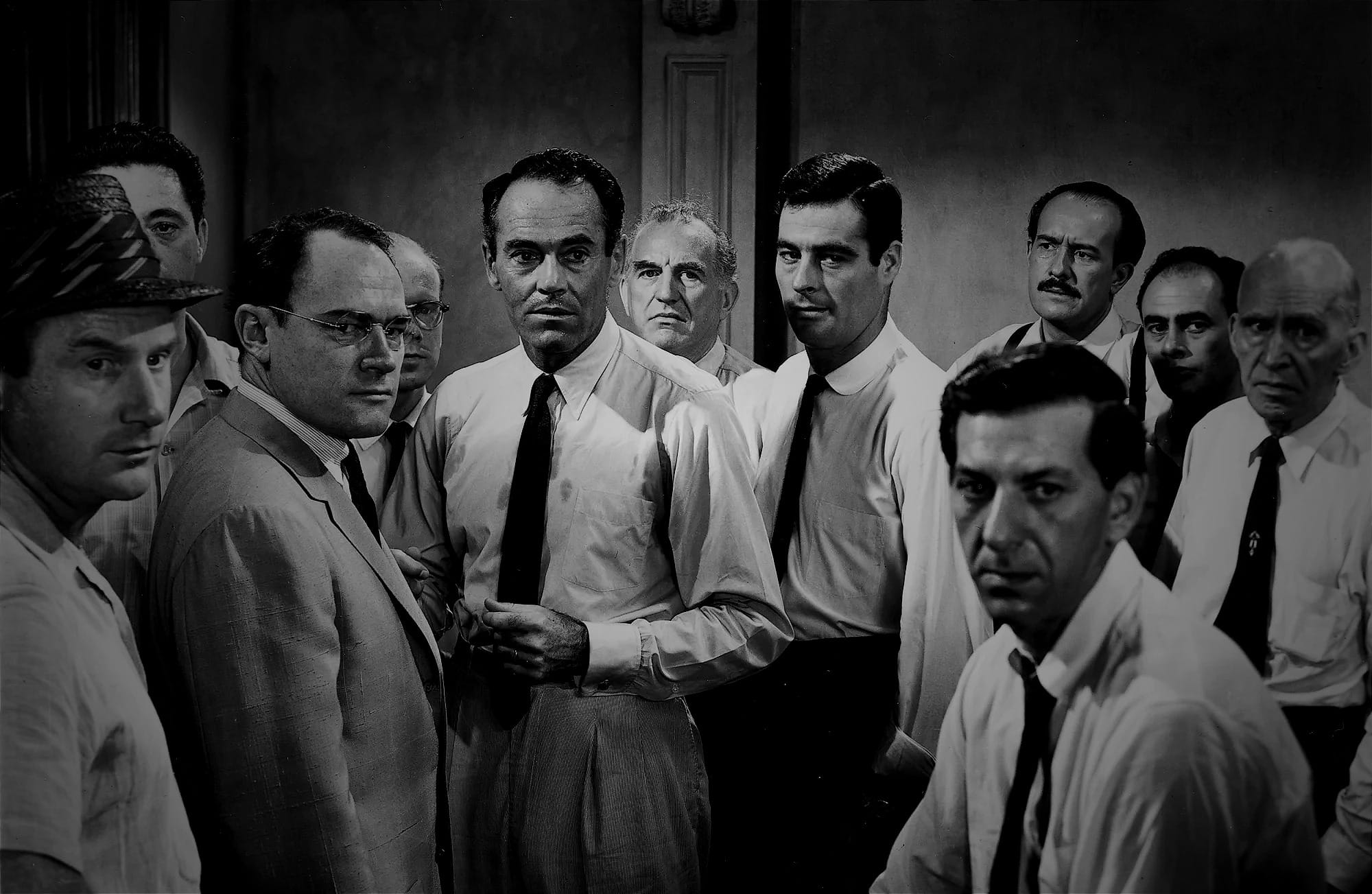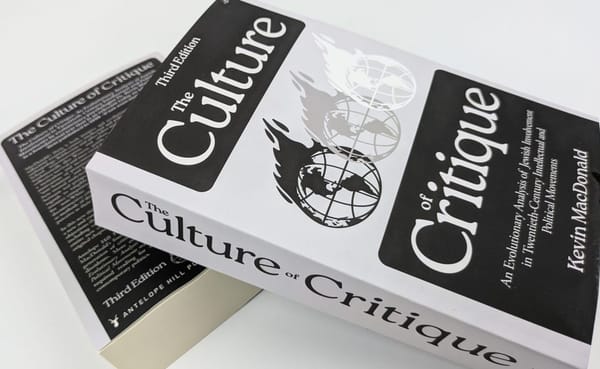In Defense of Prejudice
We have been convinced that recognizing patterns of behavior amongst people groups is to show an ungodly partiality towards the individual members of that people group.

One Prejudiced Man
In the 1957 film 12 Angry Men, a jury of twelve New York men are asked to determine guilt or innocence in a murder trial. Notably, the defendant is a poor young man from the slums of the city. Drama unfolds as the jury slowly discovers that the case against the man is not as air-tight as originally supposed. Near the end of the story, one of the last holdouts for the ‘guilty’ vote is an elderly man who is fully prejudiced against the slum-dwelling poors. In a dramatic climax, the prejudiced man stands up and rants about these people.
“They don’t know what the truth is,” the prejudiced man claims. “They will kill someone without any thought. That’s the way they are! By nature! Violent!”
During this tirade, the other jurymen slowly stand up and turn their backs on the prejudiced man until he is shamed away into a corner of the room; where he finally admits defeat without another word. The star of our film, Henry Fonda, then delivers the moral of the story: “Wherever you run into it, prejudice always obscures the truth.”
Prejudice can indeed obscure the truth, but it does not always do so. And in our generation, society prefers to err on the side of individualism and fairness; creating a distortion of truth in the opposite direction.
Prejudice and the Truth
Let us define ‘prejudice’ for our purposes. Prejudice is to pre-judge. It is to have preconceived ideas about someone based on general attributes before fully examining the individual man. Many modern ‘sins’ (racism, sexism, homophobia, islamophobia, ageism, classism, ableism) stem from a misplaced condemnation of prejudice.
For about a century, the West has declared that all prejudice (now more often termed “discrimination” or “stereotyping”) of human beings is flat-out wrong. We have been taught to “judge a book by its cover” is unjust in-and-of-itself. We are taught to look at every man as an individual, and discouraged from judging his group membership. To associate a man with a larger people group IS to judge him unjustly. This has become the law of our land. In Obama’s Affordable Care Act all healthcare facilities were banned from any type of ‘discrimination,’ and in 2024 Biden strengthened this to be a positive requirement of hospitals to implement anti-discrimination policies; they must prove to the government that they are putting enough effort into fighting discrimination. This is the air we breathe in 21st century America.
The Sin of Noticing
Christians themselves are very much swept up in the morality of anti-discrimination. Modern Christians agree with the world that it is morally wrong to pre-judge anyone based on their race, national origin, sex, age. We have been convinced that recognizing patterns of behavior amongst people groups is to show an ungodly partiality towards the individual members of that people group.
This has codified a new sin in the conscience of the Modern Christian: the Sin of Noticing. The sin of noticing that certain ethnicities (as a group) behave differently than other ethnicities; or noticing that the female gender (as a group) behaves differently than the male gender. Such things are beyond the pale. But for you, my dear reader, when I lay it out this bluntly, perhaps you are rolling your eyes and thinking, “Of course! We all know they’re different! But why are they different? That’s the real question!”
And that is a valid point! But for the purposes of this short treatise I will not be engaging with the sundry arguments around why particular groups behave differently. Our first order of business must be to examine our society’s a priori aversion towards these differentiations. I believe we often move too quickly into the debate over what causes the differences between groups. This can be a way of avoiding our aversion to the reality that the differences exist at all. We would love to discover that such differences are not permanent, so that we could eventually forget they ever existed. But for now let’s acknowledge that such differences are a reality, and see if we can agree that prejudice is not always hateful or unjust—in fact prejudice might be a necessity.
To that end, permit me to attempt a syllogism in defense of prejudice:
- Distinct groups exhibit unique behavioral patterns.
- Unique behaviour necessitates tailored responses.
Ergo: different groups warrant differentiated responses.
If we are honest we have to admit that this is a major sticking point for almost every Western Christian man. We are the product of the liberalism of the 1990s and 2000s. We want to believe there is a universal individualism. That we can treat every single individual as a blank slate. We want all to be equal. We know all to be equal in the eyes of Christ. We want all to be equal in the eyes of man. The unfortunate truth: not all people (or people groups) are equal.
Yes, it is true that all men have fallen short of the glory of God. Yet truth forces us to admit that not all men are equal. Everywhere we see this is true for the world we live in. (Again, for the moment, let us refrain from jumping into the questions of why groups behave differently and just try to accept the fact that it is simply true.) If it is true that different people groups behave differently, does it not necessarily follow that we must treat certain groups differently than others?
In the Real World

Let’s take this discussion out of the vapors of abstraction and plant it back into the firm ground of reality to explore how a right and godly prejudice might be put into practice. In the above London crime statistics we can find sexual offenses by nationality of the offender. Some may try to discredit these statistics as compromised or unreliable, but let’s remember that this is London, England—a city with a Leftist government in a nation with a Leftist government. The Leftists collecting this data are much more likely to obscure this point than to exaggerate it. So for the sake of our example let’s take the data as accurate.
We find that 6.5 out of 10,000 men of British nationality were charged with a sexual offense in London whereas nearly 75 out of 10,000 men of Afghan nationality were charged. i.e. men of Afghan nationality were eleven times more likely to be charged with a sexual offense than men of British nationality.
If this is true, how then should Christian men act? Imagine that you have a daughter who is walking in London and encounters a random man. Is it sin for your daughter to treat an Afghani man with more caution than a British man? Do you think it is at all relevant to your daughter’s safety that the Afghani man is statistically more than 11x more likely to be charged with a sexual assault than the British man? Or is it more important that she remember not to “judge a book by its cover”? Would it be sinful for a father to teach his daughter that men of a certain nationality pose a much greater threat to her safety than men of a different group?
1 Timothy 5:8, “But if any provide not for his own, and specially for those of his own house, he hath denied the faith, and is worse than an infidel.” If we accept this responsibility, then we must admit that our call to love everyone (even our enemies) does not allow us to abandon our duty to our own, especially our own household.
Therefore, if you know it to be true that a particular ethnicity, gender, or religion is especially dangerous to your family, obscuring or ignoring this fact is willfully abandoning your duty towards protecting your own. We may wish that we lived in a world where all groups of people behaved identically, but that is not the actual world that we currently live in. Indeed, it is not the world that God intended for us to live in. Everywhere in Scripture God indicates that people are different. Differentiation is assumed. For example: “We then who are strong ought to bear with the scruples of the weak”. How will Christians live out this command if we are offended by the categories of strong and weak? Jesus tells us “the poor you shall always have with you”, should we then be offended by the very concept of the poor?
Taken to the extreme, going without pre-judging humans is functionally impossible. Humans are designed to use heuristic shortcuts to process the complex world around us, and this is nowhere condemned by God in Scripture. The Christian therefore must regain a moral use of prejudice and reject the idealized vision of the world that the liberal modernity teaches. Refusing to accept what is true about the world God created is not a Christian virtue. God is truth. There is nothing true that goes against the Truth.
When we Christians are willing to accept this, we see that it is everywhere in Scripture. In perhaps the most glaringly obvious example, Paul gives Titus a warning that “Cretians are alway liars, evil beasts, slow bellies” (1:12) and instructs Titus to “rebuke them sharply, that they may be sound in the faith” (v. 13). Paul here is doing exactly what I am defending. Paul is using prejudice (pre-judging, generalizing, stereotyping) to give Titus wise advice on how he should act (in general) towards the Cretans.
Imagine how disproportionate it would be if Titus took Paul’s advice as license to be hateful or abusive towards the Cretans in his church. How ridiculous it would be if Titus said to the Cretans, “I will never believe anything you say, because Paul told me you are always liars. Not one word out of your mouth can ever be true!” And yet this is the caricature in 12 Angry Men that is used to condemn all prejudice as evil. If Titus were to behave in such a way, then indeed he would have fallen into sin. However, we have no evidence that Titus behaved thus. Is it not much more reasonable to see that Paul was giving Titus broad and generalized judgement on the behavior of Cretans as a group–to give Titus advice on how he should best serve the people group that God had called him to serve. I find this to be the far more likely exegesis.
Prejudice vs. Partiality
As Christians, we know there is sin in allowing personal prejudice to cloud our judgement. This is the sin of partiality. Leviticus 19:15 commands “Ye shall do no unrighteousness in judgment: thou shalt not respect the person of the poor, nor honour the person of the mighty: but in righteousness shalt thou judge thy neighbour". James tells us “If ye have respect to persons, ye commit sin” (James 2:9). And for many Christians, ‘prejudice’ means the same thing as the sin of partiality. We associate any pre-judging of someone with unjust judgement.
The Greek concept is expressed in the term prosōpolēpsia, which is translated as “favoritism” or “respect of persons,” as in Romans 2:11 and Colossians 3:25. Another passage that contains this concept is Galatians 2:6, “But of these who seemed to be somewhat, (whatsoever they were, it maketh no matter to me: God accepteth no man’s person)…”. We can see from this short comment that Paul is agreeing with God that he does not confer additional respect towards those who were mighty in the church based on their status, appearance, or identity.
Consistently in Scripture the Lord reminds us that we are not to show favoritism towards any man due to the fact that when compared with the Almighty God every man is worth nothing. We are reminded over and over not to be impressed with the strength of men but instead to keep our mind fixed on the heavenly things which are so much greater than even the greatest of the things of this world. This allows us to see the world’s virtues with the proper perspective—the spiritual and eternal perspective.
That being said, there is certainly a sinful injustice that takes place here on earth when men show partiality in their judgment. We are clearly instructed to “have not the faith of our Lord Jesus Christ, the Lord of glory, with respect of persons” (James 2:1), for “there is no respect of persons with God” (Romans 2:11). The sin of partiality is the sin of judging for or against an individual based on his attributes rather than the truth. In the 12 Angry Men example, the prejudiced man was indeed guilty of the sin of partiality because he was unwilling to exonerate an innocent man based on the man’s socioeconomic class.
The Bible most often reveals the sin of partiality in the same context that 12 Angry Men does: the strong oppressing the weak, the rich exploiting the poor, for historically this was by far the most likely context for partiality to rear its head. Why? Because the strong and rich had the power to wield such partiality and the poor and lowly did not even possess the opportunity for sin in this area.
These tables have turned. The ethics of humanism, liberalism, and relativism have steadily marched the world towards the inversion of power dynamics. In an effort to resolve the most common forms of partiality, the world adopted an anti-partiality which was the same sin in the other direction (see also racism and anti-racism). Christians have been easy targets for this trap, as it seems to align with Christian virtues of love and charity. This was a trap set by the enemy.
It is not loving to oppress the rich on behalf of the poor, it is partiality. When Jesus proclaimed “Blessed are the meek,” he was not calling for the meek to rise up and subvert the strong. No, Jesus is instead teaching that the humble, broken-hearted, and contrite will see the Kingdom of God. But we must not confuse this spiritual path with the world’s newfound partiality against the strong in favor of the weak. Leviticus 19 clearly shows that the Lord detests partiality against both the rich and the poor.
In the 19th century Nietzsche foresaw this inversion and warned, “Strange though it may sound, one always has to defend the strong against the weak; the fortunate against the unfortunate; the healthy against those degenerating.” Nietzsche also laid out the steps the poor would take, “Datum: the oppressed, the lowly, the great masses of slaves and semi-slaves desire power.
First step: they make themselves free—they ransom themselves, in imagination at first, they recognize one another, they prevail.
Second step: they enter into battle, they demand recognition, equal rights, “justice.”
Third step: they demand privileges (they draw the representative of power over to their side).
Fourth step: they demand executive power, and they get it.”
This revolution has been accomplished. Unfortunately, many Christians have been convinced to go along with the injustice of the world’s partiality because they believe it to be a form of godly justice, and they are more concerned with the sin of prejudice than the sin of partiality.
The World and Everything in It
When Christ commissioned the apostles to go and make disciples of all nations, he did not command that we also treat the nations as perfectly identical. One of the most beautiful attributes of our world is the depth of its diversity. Everywhere we find diverse and distinct people, places and things revealing the manifold glory of the Creator. The modern mind rejects this diversity and demands that everything instead be flattened, fungible, and undifferentiated such that it has now become a sin to even notice that some things are not the same as others, and an even greater sin to act according to that knowledge.
There is room for debate on why people groups diverge, and how we should act accordingly, but for now I hope that the reader can perhaps agree that pre-judging may not always obscure the truth—and instead much truth may have been obscured in our battle against prejudice.
ATTENTION READER: We need your help.
Institutional trust is at record lows. But without institutions, we cannot renew our people, much less provide an inheritance to posterity. In response to this crisis and as an organic outgrowth both of necessity and natural interest, American Mantle exists. And so we make our appeal.
Donate to the Cause. Help us reach our monthly goal in order to solidify this crucial institution.







